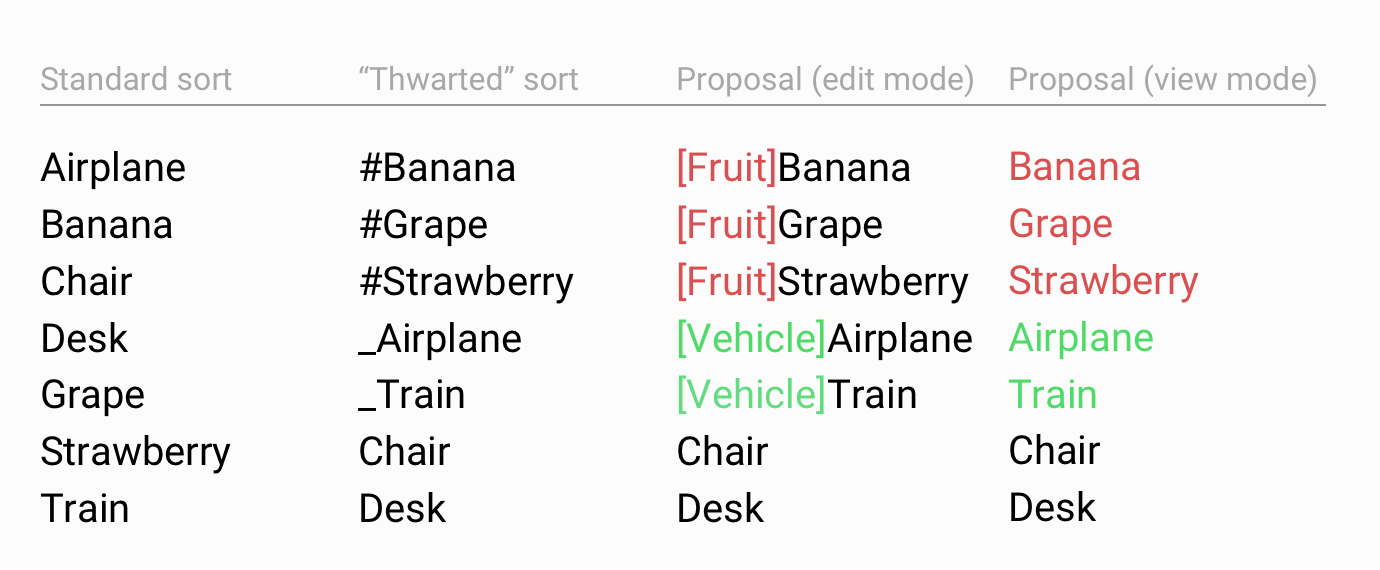When it comes to optimising the design, users happen to be the best designers.
I would suggest that – instead of guessing - you should get in touch with these Users, who hacked the sorting mechanism to ask what they wanted to achieve.
Maybe they wanted just to pin some items to the top of the list, for which starring would probably be enough.
But maybe this is just a symptom of a deeper need, maybe it needs to be somehow ordered or structured. Without asking them it will be hard to implement the right mechanism in this case.
EDIT (after some discussion in comments below):
Thank you everyone for your valuable comments. I think this answer needs some clarification.
There are cases, when Users want to try to escape the boundaries planned by the designer. From their actions, some conclusions may arise, but quick conclusions about the solutions are not always the right ones.
A little digression first, you can skip it if you want. There is a meme about user experience, showing a gate and a path around it, made by Users. While it is easy to criticise, answering what the solution is, just based on this behaviour, is risky. Should it be removing the gate, it would be easy. However, maybe it has its purpose, actually? It may prevent animals from getting inside, it may be a legal requirement to have it and if one thinks more of it, probably they will find some more possible answers to the questions: "Why it is here?" and "Why people try to go around it?".
Asking Users should be a core part of creating a solution if we are not sure about the nature of the problem. And in this case – we may guess, but in my eyes, implementing any solution based on a conclusion would trigger a risk of the "solution" being inaccurate, not answering the actual need of the User.
In this particular case, this behaviour may mean that people want to have some items pinned to the top, but also here there are some more possible answers:
- They may need to have some most recently edited items pinned to the top. Again, this could be resolved by pinning, but in longer run this owuld require from them a lot of effort to maintain, as they will need to "unpin" the ones that are not relevant any more,
- They may need to flag the items with different flags, where pinning would be not enough,
- They may need categories/folders, especially if they use different file naming conventions (namely: _thingname.ext and __thingname.ext or [thingname].ext etc.) which would suggest a need of a more structured set, which also cannot be solved just by pinning,
- Sub-ordering these items - sorting by something first, then something,
- Finally, there may be some needs that go beyond these assumptions.
So, there is a lot to analyse here.
Now to the users happen to be the best designers line. When they use something - be it a computer or a desk or a cup or whatever else – people often change the way these things work in a tiny little bit. They place that sticker on the camera of the laptop, tie the teabag to the handle of a cup, organise their things on their desk so that it is comfortable for them. They invent solutions to their needs and implement them - so they are designers. This very design, if observed, can be a source of further evolution of the things (camera blocker, a cup with a teabag holder, a desk with a holder for pens built it).
Therefore, if they hack the naming of things within this solution, it is good to observe what they come up with. This may lead to a deeper knowledge of what they want to achieve. Having all this input, it is easy to ask them one crucial question: "Why do you do it like this? What do you want to achieve?"
And after gaining this knowledge, to conclude, ask them again if this is what they wanted, maybe suggest something better than they would come up with, of course. But only having this confirmation - to come up with the solutions and implement them.
In other words, the behaviour of Users in this case my be a direct indication of their need (and in this case, pinning might be a good choice), but it can be just a symptom (in which case, asking before implementing or even suggesting any solution is the best choice).

